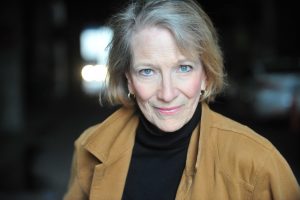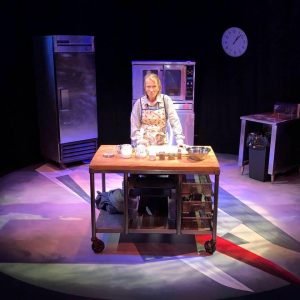
Jan Lucas – Courtesy of Manon Halliburton. Used with permission.
I had the pleasure of meeting actor, writer and musician Jan Lucas in February at Fonseca Theatre Company. She was there, attending a performance of “Les Chanteuses,” a production of Magic Thread Cabaret, of which I am managing director. Having seen Lucas in several performances over the years, I was delighted to finally become acquainted with an actor whom I have long admired for her formidable talent. What struck me when we met was that her vibrant personality matches her stage presence, which is as substantial as her credits.
Lucas, a Chicago native has worked extensively at Indiana Repertory Theatre, most recently in “You Can’t Take It with You.” She has appeared at Phoenix Theatre in “Over the Tavern,” various incarnations of “Pure Prine,” “The Pill” by playwright-in-residence Tom Horan, the one-woman show “Apples in Winter,” and most recently, “A Very Phoenix Xmas: Winston’s Big Day.” Other credits include Summit Performance Indianapolis, Jewish Theatre of Bloomington, Goodman Theatre, Steppenwolf, and Remy Bumppo Theater Company in Chicago, and she has been in countless TV commercials. As a playwright, she has written “Talking American” and “Freedom is My Home” for young audiences.
Additionally, for ten years Lucas has performed as a singer and co-writer with husband Tim Grimm a singer-songwriter, musician and actor. Along with their sons, they have performed as Tim Grimm and The Family Band, touring Europe and the States, and they were all together on stage for “Finding Home: Indiana at 200” at IRT.
Lucas, the mother of three adult children, Lucas, 38, Connor 28 and Jackson, 26,is quarantined with her husband at their rural home on 55 acres, outside Columbus, Indiana. Like others I have written about during the quarantine, I engaged Lucas-Grimm via email, rather than by phone. I find my subjects tend to be more thoughtful and reflective in written communication. Lucas-Grimm, who generously expresses her feelings, did not disappoint with her responses to my questions. Below is our exchange.
What is your greatest yearning at this time?
That’s a tough one. My yearnings are big and small. I yearn for my community of artists. I yearn for family gatherings. I yearn for government leadership to inspire and create hope. The impact of the virus has fallen down predictable racial and economic lines and I yearn for that to change.
What is your greatest fear?
My greatest fear is a selfish one: that someone in my family will die of this virus, or that I will. I have a compromised immune system having survived Acute Myeloid Leukemia and a bone marrow transplant. I didn’t go through the years of chemo, post -transplant ills, and slow, arduous recovery to then die of a virus, dammit!
I fear our world will go back to business as usual, that the lessons of cooperation, collaboration, and the obvious interconnectedness of life will get swept under the rug. I love the term “The Great Pause” about this time: we have been forced to take a major break from our daily lives and the planet is getting a massive reprieve. But money is the driver of so many systems and I fear that greed will supersede the need to address climate change, for one, and the need for a change in our health care system, among others.
What do you miss the most?
PEOPLE! In-the-flesh, living, breathing, huggable people. Gatherings, working in theatre, public places.

Jan Lucas in “Apples in Winter” Phoenix Theatre. Courtesy of Zach Rosing Used with permission.
How has the pandemic affected you professionally?
I was scheduled to start rehearsals for the show “Alabaster” at the Phoenix at the beginning of April. It has been rescheduled for July, but we will see. Tim and I were also scheduled to fly to Europe to lead a music tour of Scotland and he to lead a tour of Ireland and that’s on hold. I am writing for a collaborative show about the bicentennial of Indianapolis for IRT and I can certainly do that in my time of quarantine, so that’s good.
How have you spent your time during the quarantine?
Not as productive as I thought I’d be! I find the lack of deadlines and an imposed structure have really impacted my focus and ability to get things done. The novelty of the first two weeks made it almost fun to be cooking and baking more, playing word games with Tim, long walks with my dog. Now it is getting tedious and the horror of the global situation, the horror of the number of deaths, the horror of various groups of people going through this in ways so different from mine have conspired to make this time a very dark one. I am lucky to live out in the country where I can get my hands in the soil, dig and weed and plant in my garden. I haven’t had a big vegetable garden in years and this summer looks to be bringing it back. And I am starting to be able to discipline my time to focus on writing, practicing piano, organizing piles of stuff I’ve never had the time to deal with.
What has the pandemic taught you?
I am reminded how much I love the theatre community of Indianapolis and beyond in greater Indiana. I am reminded that everyday interactions with people, in the grocery store or the post office or walking in a park, are beautiful and important. I am reminded not to take anything for granted.
Do you think the world will ever return to normal, as we knew it before COVID-19?
I hope it doesn’t. I hope we are changed in positive ways. I hope the pain of this time has not been for naught.
Do you see any bright spots resulting from the pandemic?
The Earth is certainly getting a breather. People are reaching out in new ways to each other. People are doing amazing and creative and brilliant things to work on solving some of the problems created by the pandemic. I’m thinking of college dorms that have been opened to homeless people. Or the doctors who are collaborating to work on treatment of the virus, such as the docs who are working with blood-clot meds to help dissolve the clots that form in lungs of COVID-19 patients. Or the legions of folks sewing masks. Or the bookstores working to help the families that are suddenly homeschooling.
What is your message to your fellow artists?
I love you. Stay strong. We are in this together. Awesome art usually comes out of crisis and tragedy, as we know. Be open to the possibilities that may be hidden in plain sight.
What is your message to the public regarding support of artists and arts organization during the pandemic?
There have been a few posts on social media I’ve seen that address this. One is that while in isolation, more than ever, people are watching movies, TV shows, listening to music, watching online concerts, etc. People are looking to the ARTISTS to help get them through. That’s a great example of how essential artists are. Now more than ever, show your support and appreciation any way you can, monetarily especially. The other was a post explaining how being an artist is a REAL JOB. People forget what it takes to be an artist.





